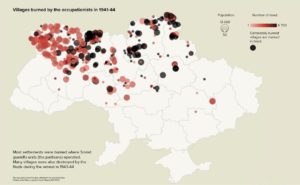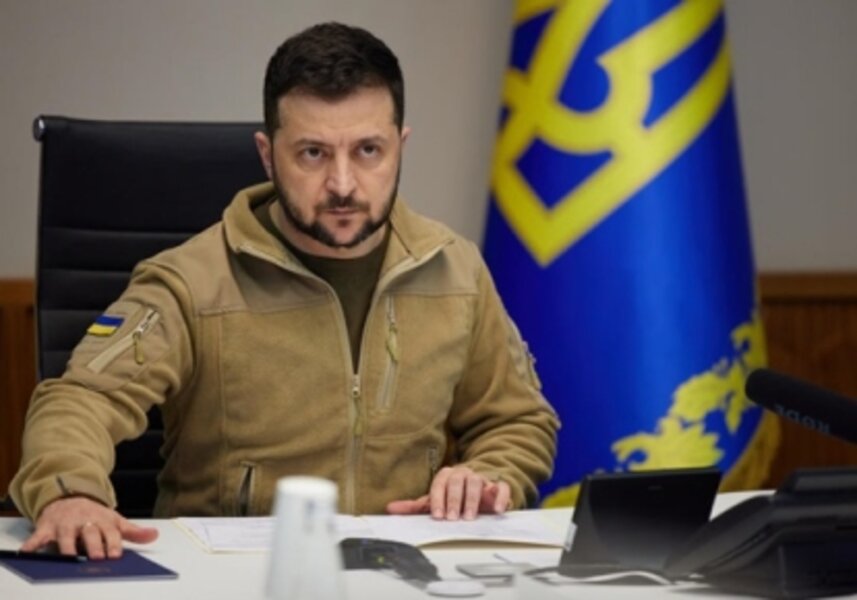The Day of Remembrance and Victory over Nazism in World War II is of outstanding importance for the entire world community. This day symbolizes the victory of good over evil, emphasizes the unbending will of humanity to defend freedom and justice. This day also symbolizes the many millions of human sacrifices on the path to Victory. Seventy-nine years ago, the joint actions of the anti-Hitler coalition returned the world to the orbit of law order and democracy.
The lion’s share was taken by Ukraine and its people. At least 10 million Ukrainians, including civilians and prisoners of war, died for Victory. Among the dead Ukrainians were at least 3 million soldiers and officers. In total, every fifth Ukrainian died in World War II. Among the military personnel conscripted in the summer of 1941, only 3 % of the total survived. For comparison, these losses are approximately equal to the combined losses in World War II of Germany, France, Great Britain and the United States.
In fact, the losses of the Ukrainian people amounted to 40 % to 44 % of the total human losses of the USSR. Of the 41.7 million people who lived in the Ukrainian SSR before the war, in 1945 only 27.4 million people remained.

The Ukrainian people played a decisive role in the defeat of Nazi Germany. Seven Ukrainians were commanders of the fronts of the Soviet army, 200 were generals. More than two thousand Ukrainians received the highest award in the USSR — the title of Hero of the Soviet Union — for heroism during the battles. About 6 million Ukrainians fought in the ranks of the Red Army. This amounted to approximately 23% of the total strength of the USSR armed forces. And in 1944, every third Red Army soldier came from Ukraine. Ukrainians accounted for 60-80 % in the infantry units and formations of the 1-4 Ukrainian Fronts.
The decisive battles of the Soviet-German war are connected with Ukraine. 60% of the Nazi ground forces were defeated here.
Ukrainians took part in the war against Germany as part of other armies and military units. In particular, many of them served in the Polish (120 thousand), American (80 thousand) and Canadian armies (45 thousand). They also fought in the French Resistance Movement (5 thousand). Thousands of Ukrainians served in the Polish army of General Władysław Anders and participated in military operations on the British side in Egypt, Libya and Italy. Also, Ukrainians from Western Ukraine made up 2 % of the Polish division of Tadeusz Kościuszka and 70 % of the Czechoslovak brigade of General Ludvík Svoboda.
The global recognition of Ukraine’s contribution to the victory in World War II was not prevented by its stay as part of the USSR. In 1945, the Ukrainian SSR, separate from the Soviet Union, became one of the 51 founding states of the UN.

The territory of Ukraine in World War II was an important theater of military operations, and its entire land was soaked in blood and suffering. During World War II, 700 Ukrainian cities and 28 thousand villages were destroyed.

As a result of World War II, Ukraine suffered material losses to more than 45 % of the damage to the entire USSR. Under the slogan “Everything for the front! Everything for victory!” the Bolsheviks removed from Ukraine 550 industrial enterprises, property and livestock of thousands of collective farms, state farms, MTS, dozens of scientific and educational institutions, cultural centers, and historical values to create a powerful military-industrial potential in the east of the USSR. The enterprises constructed literally on the Ukrainian people’s blood during the 1930s became the basis for the creation of the military-industrial complex in the eastern part of the USSR in the post-war years.
Almost 3.5 million residents of the republic left — skilled workers and specialists, scientists, creative intelligentsia, who devoted their life, intellectual property to the development of the military and economic potential of the USSR.

Unfortunately, decades later, Evil was reborn again in modern Russia. The institutions and organizations created following the Second World War, aimed at ensuring peace and stability, could not prevent the emergence of a new fascist power under a different banner. It was Putin in the Kremlin who brought misfortune and threat to the world order at the beginning of the 21st century.

Today Russia accuses everyone of “rewriting history.” At the same time, it is trying to impose the version of history that was written by the Soviet totalitarian regime. For that regime, history was nothing more than a means of ideological manipulation and concealment of its own crimes. By defending this approach, the Kremlin, in fact, becomes a falsifier of history itself. Putin’s Russia is a direct successor of the Soviet regime — from the point of view of both the aggressive imperial essence of the state and the criminal, inhumane methods of achieving its goals through military means. But in fact, the Ukrainian people serve as a deterrent in the path of Moscow’s imperial ambitions.

